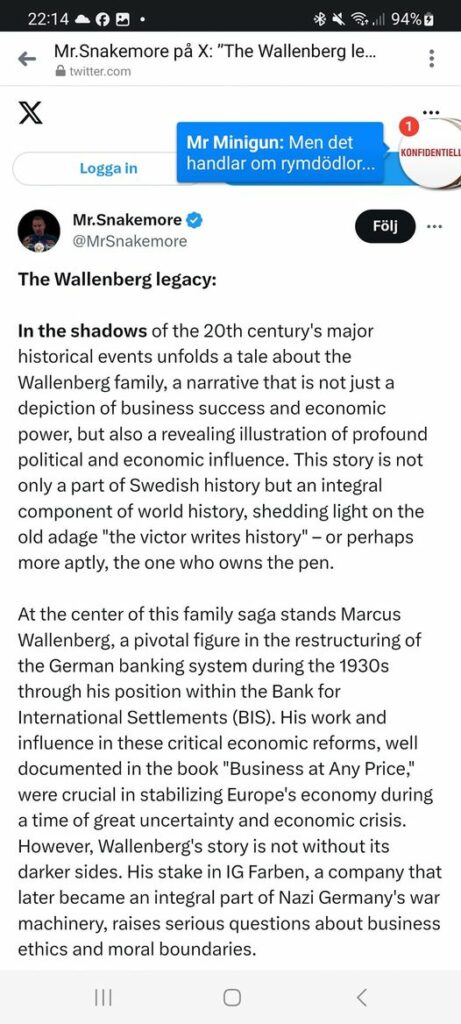En Wallenberg-Berättelse
2024-01-29

I centrum av denna familjesaga står Marcus Wallenberg, en avgörande figur i omstruktureringen av det tyska banksystemet under 1930-talet genom sin position inom Bank for International Settlements (BIS). Hans arbete och inflytande i dessa kritiska ekonomiska reformer, väl dokumenterat i boken "Business at Any Price", var avgörande för att stabilisera Europas ekonomi under en tid av stor osäkerhet och ekonomisk kris. Wallenbergs historia är dock inte utan sina mörkare sidor. Hans andel i IG Farben, ett företag som senare blev en integrerad del av nazisttysklands krigsmaskineri, väcker allvarliga frågor om affärsetik och moraliska gränser.
Förutom sin finansiella och industriella verksamhet utökade familjen Wallenberg sitt inflytande till telekommunikationsinfrastruktur genom Ericsson och blev en del av en värld av övervakning och kryptologi genom samarbeten med företag som Siemens och Crypto AG. Denna expansion av deras affärsimperium till teknik och kommunikation visar en mångsidig och strategisk manövrering i skuggorna av globala maktspel.
Dessutom var Wallenbergs bankverksamhet med Volpi di Misurata i Banca Commerciale Italiana inte bara ett finansföretag utan också en kanal för finansiering av fascisterna i Italien. Detta samarbete belyser familjens komplexa och ibland kontroversiella politiska och ekonomiska engagemang i Europa. Ett annat avgörande ögonblick i Wallenbergsläktens historia var Ivar Kreugers död och Wallenbergs efterföljande återtagande av kontrollen över företag som Ericsson, en händelse som kan ses som en förutsättning för dåtidens geopolitiska utveckling.
Lägger till denna redan komplexa bild är Wallenbergs koppling till Felix Kersten, privatläkaren till både Heinrich Himmler och Adolf Hitler. Denna förbindelse är inte bara märklig utan också potentiellt avslöjande av familjens nätverk och inflytande under denna turbulenta historiska period. Dessutom understryker familjen Wallenbergs förmåga att påverka utnämningar och befattningar inom internationella organisationer som FN och IMF deras omfattande inflytande. Ett exempel på detta är fallet med Per Jacobsson, vars karriär och befattningar i internationella organisationer verkar ha påverkats av familjen Wallenberg.
Denna berättelse om familjen Wallenberg är inte bara en skildring av affärsframgång utan också en kritisk påminnelse om hur makt och inflytande kan forma inte bara ekonomiska utan även politiska händelser på global skala. Det är ett berättande som påminner oss om att historien ofta skrivs inte bara av segrarna utan av de som äger pennan. I fallet med familjen Wallenberg är det en penna som ritat om konturerna av både svensk och internationell historia och fortsätter påverka vår förståelse för dåtid och nutid.
In the shadows of the 20th century's major historical events unfolds a tale about the Wallenberg family, a narrative that is not just a depiction of business success and economic power, but also a revealing illustration of profound political and economic influence. This story is not only a part of Swedish history but an integral component of world history, shedding light on the old adage "the victor writes history" – or perhaps more aptly, the one who owns the pen.
At the center of this family saga stands Marcus Wallenberg, a pivotal figure in the restructuring of the German banking system during the 1930s through his position within the Bank for International Settlements (BIS). His work and influence in these critical economic reforms, well documented in the book "Business at Any Price," were crucial in stabilizing Europe's economy during a time of great uncertainty and economic crisis. However, Wallenberg's story is not without its darker sides. His stake in IG Farben, a company that later became an integral part of Nazi Germany's war machinery, raises serious questions about business ethics and moral boundaries.
Beyond their financial and industrial activities, the Wallenberg family extended their influence to telecommunications infrastructure through Ericsson and became part of a world of surveillance and cryptology through collaborations with companies like Siemens and Crypto AG. This expansion of their business empire into technology and communication demonstrates a versatile and strategic maneuvering in the shadows of global power games.
Moreover, Wallenberg's banking activities with Volpi di Misurata in Banca Commerciale Italiana were not just a financial enterprise but also a channel for financing the fascists in Italy. This collaboration highlights the family's complex and sometimes controversial political and economic engagements in Europe. Another pivotal moment in the Wallenberg family's history was the death of Ivar Kreuger and Wallenberg's subsequent retaking of control over companies like Ericsson, an event that can be seen as a precondition for the geopolitical developments of the time.
Adding to this already complex picture is Wallenberg's connection to Felix Kersten, the private physician to both Heinrich Himmler and Adolf Hitler. This connection is not only peculiar but also potentially revealing of the family's network and influence during this turbulent historical period. Furthermore, the Wallenberg family's ability to influence appointments and positions within international organizations like the UN and IMF underscores their extensive influence. An example of this is the case of Per Jacobsson, whose career and positions in international organizations appear to have been influenced by the Wallenberg family's clout.
This story of the Wallenberg family is not just a portrayal of business success but also a critical reminder of how power and influence can shape not only economic but also political events on a global scale. It is a narrative that reminds us that history is often written not just by the victors but by those who own the pen. In the case of the Wallenberg family, it is a pen that has redrawn the contours of both Swedish and international history and continues to influence our understanding of the past and present.
Visa ditt stöd till det informationsarbete Carl genomför
Patreon
Swish

Scanna QR eller skicka till 076-118 25 68. Mottagare är Caroline Norberg.
